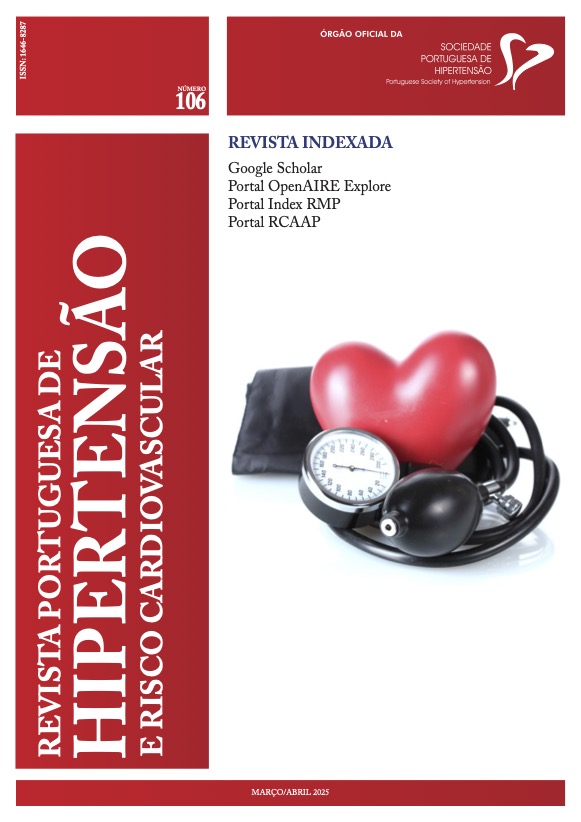O PAPEL DA LITERACIA EM SAÚDE NA ADESÃO TERAPÊUTICA EM DOENTES COM HIPERTENSÃO ARTERIAL: UMA REVISÃO BASEADA NA EVIDÊNCIA
DOI:
https://doi.org/10.58043/rphrc.161Palavras-chave:
Hipertensão arterial, literacia em saúde, adesão terapêuticaResumo
Introdução: A Hipertensão Arterial (HTA) é a doença cardiovascular mais prevalente a nível mundial. Apenas uma em cada cinco pessoas com HTA terá a doença controlada. A adesão terapêutica desempenha um papel crucial no controlo da HTA. Num estudo realizado em 2008, constatou-se que metade dos pacientes com medicação anti-hipertensora a descontinuaram no prazo de um ano.Objetivo: Compreender o papel da literacia em saúde na adesão terapêutica em adultos com HTA.
Métodos: Para a realização desta revisão, foram usados os MeSH terms: “health literacy” AND “hypertension” AND “medication adherence”. Foi realizada uma pesquisa de revisões sistemáticas (RS), ensaios clínicos randomizados, meta-análises e artigos publicados entre 2013 e 2023, nas línguas portuguesa, inglesa e espanhola, nas bases de dados Cochrane Library e PubMed. Foi utilizada a metodologia PICO - População: adultos (≥18 anos) com HTA; Intervenção: literacia em saúde; Comparação: não intervenção; Outcome: adesão terapêutica; O nível de evidência e os graus de força de recomendação foram atribuídos tendo por base a classificação SORT (Strenght of Recomendation Taxonomy).
Resultados: Da pesquisa inicial, foram selecionados 108 artigos, dos quais 82 foram excluídos após leitura do título ou do resumo. Após leitura integral dos artigos, 9 cumpriram os critérios de inclusão: duas RS e 7 estudos observacionais.
Discussão/Conclusão: Dos 9 estudos analisados, três não demonstraram relação estatisticamente significativa (n=807), enquanto que 6 demonstraram relação estatisticamente significativa (n=4094).
A principal limitação identificada foi o uso de diferentes escalas para a avaliação da adesão terapêutica e da literacia em saúde. Destaca-se ainda que a população avaliada na maioria dos estudos pertence a minorias e, até à data, nenhum estudo foi realizado a nível europeu.
De acordo com a revisão realizada, a evidência aponta para impacto positivo da literacia em saúde na adesão terapêutica em adultos com HTA (Força de recomendação B).
Downloads
Referências
WHO 2021 (http://www.who.int/news-room/fact-sheets/detail/hypertension)
Sabaté E, Sabaté E. Adherence to Long-Term Therapies: Evidence for Action. World Health Organization; 2003.
Vrijens B, Vincze G, Kristanto P, Urquhart J, Burnier M. Adherence to prescribed antihypertensive drug treatments: longitudinal study of electronically compiled dosing histories. BMJ. 2008 May 17;336(7653):1114-7.
Lee HJ, Jang S, Park E. Effect of adherence to antihypertensive medication on stroke incidence in patients with hypertension: a population-based retrospective cohort study. BMJ Open 2017;7:e014486.
Dalal JJ, Kerkar P, Guha S, et al. Therapeutic adherence in hypertension: Current evidence and expert opinion from India. Indian Heart J. 2021 Nov-Dec;73(6):667-673.
Mancia G, Kreutz R, Brunström M, et al. 2023 ESH Guidelines for the management of arterial hypertension. Journal of hypertension. 2023.
Ebell MH, Siwek J, Weiss BD, et al. Strength of recommendation taxonomy (SORT): a patient-centered approach to grading evidence in the medical literature. American family physician. 2004;69(3):548–556.
Lor M, Koleck TA, Bakken S, Yoon S, Dunn Navarra AM. Association Between Health Literacy and Medication Adherence Among Hispanics with Hypertension. J Racial Ethn Health Disparities. 2019 Jun;6(3):517–524.
Park NH, Song MS, Shin SY, Jeong JH, Lee HY. The effects of medication adherence and health literacy on health-related quality of life in older people with hypertension. Int J Older People Nurs. 2018 Sep;13(3):e12196.
Silva ICD, Nogueira MRDN, Cavalcante TF, et al. Health literacy and adherence to pharmacological treatment by people with arterial hypertension. Rev Bras Enferm. 2022 Aug 8;75(6):e20200008.
Guo A, Jin H, Ma J, et al. Impact of health literacy and social support on medication adherence in patients with hypertension. BMC Cardiovasc Disord. 2023 Feb 19;23(1):93.
Al-Ali NM, Telfah RK. The effect of health literacy in explaining medication adherence among patients with hypertension. Int J Nurs Pract. 2023 Jun;29(3):e13136.
Wannasirikul P, Termsirikulchai L, Sujirarat D, Benjakul S, Tanasugam C. HEALTH LITERACY, MEDICATION ADHERENCE, AND BLOOD PRESSURE LEVEL AMONG HYPERTENSIVE OLDER ADULTS TREATED AT PRIMARY HEALTH CARE CENTERS. Southeast Asian JTrop Med Public Health. 2016 Jan;47(1):109–20.
Hall E, Lee SY, Clark PC, Perilla J. Social Ecology of Adherence to Hypertension Treatment in Latino Migrant and Seasonal Farmworkers. J Transcult Nurs. 2016 Jan;27(1):33-41.
Maleki G, Norian R, Moeini B, et al. Factors related to medication adherence in patients with hypertension in Iran: a systematic review study. Blood Press Monit. 2023 Oct 1;28(5):221–235.
Gutierrez MM, Sakulbumrungsil R. Factors associated with medication adherence of hypertensive patients in the Philippines: a systematic review. Clin Hypertens. 2021 Oct 1;27(1):19.
Health Literacy Tool Shed. Newest Vital Sign Spanish Version - NVS-SP [Internet]. 2005 [cited 2018 Jun 12]. Available from: https://healthliteracy.bu.edu/nvs-sp
Baker DW, Williams MV, Parker RM, Gazmararian JA, Nurse J. Development of a brief test to measure functional health literacy. Patient Educ Couns. 1999;38(1):33–42.
Lee SY, Bender DE, Ruiz RE, Cho YI. Development of an easy-to-use Spanish Health Literacy test. Health services research. 2006;41(4 Pt 1):1392–1412.
Haghdoost AA, Rakhshani F, Aarabi M, et al. Iranian Health Literacy Questionnaire (IHLQ): An Instrument for Measuring Health Literacy in Iran. Iran Red Crescent Med J. 2015 Jun 1;17(6):e25831.
Duong TV, Nguyen TTP, Pham KM, et al. Validation of the Short-Form Health Literacy Questionnaire (HLS-SF12) and Its Determinants among People Living in Rural Areas in Vietnam. Int J Environ Res Public Health. 2019;16(18):3346.
Jordan JE, Buchbinder R, Briggs AM, et al. The health literacy management scale (HeLMS): a measure of an individual’s capacity to seek, understand and use health information within the healthcare setting. Patient Educ Couns. 2013;91(2):228-35.
Sun HL, Peng H, Fu H. The reliability and consistency of health literacy scale for chronic patients. Fudan Univ J Med Sci. 2012;39(3):268–72.
Ishikawa H, Takeuchi T, Yano E. Measuring Functional, Communicative, and Critical Health Literacy Among Diabetic Patients. Diabetes Care. 2008;31(5):874–879.
Cronbach LJ. Coefficient alpha and the internal structure of tests. Psychometrika. 1951;16:297–334.
Zeller RA. Measurement Error, Issues and Solutions. In: Kempf-Leonard K, editor. Encyclopedia of Social Measurement. Elsevier; 2005. p. 665–676.
Cortina JM. What is coefficient alpha? An examination of theory and applications. Journal of applied psychology. 1993;78(1):98.
Nguyen TM, La Caze A, Cottrell N. What are validated self-report adherence scales really measuring?: a systematic review. Br J Clin Pharmacol. 2014 Mar;77(3):427-45.
Morisky DE, Green LW, Levine DM. Concurrent and predictive validity of a self-reported measure of medication adherence. Medical care. 1986;24(1):67–74.
Kripalani S, Risser J, Gatti ME, Jacobson TA. Development and evaluation of the Adherence to Refills and Medications Scale (ARMS) among low-literacy patients with chronic disease. Value Health. 2009 Jan-Feb;12(1):118-23.
Sandhya M, Ramesh P, Penupothu N, Naveen G. Assessing adherence to hypertension medications and its impact on blood pressure control: A community-based observational study. Asian Journal of Medical Sciences. 2023;14:61–66.
Jhaj R, Gour PR, Kumari S, Sharma S. Association between medication adherence and blood pressure control in urban hypertensive patients in central India. International Journal of Noncommunicable Diseases. 2018;3(1):9-14.
Cangussu LR, Alho EA, Silva AL, et al. Low health literacy and quality of life in patients with systemic arterial hypertension. Dialogues in Health. 2022;1:100036.
Claros NM. Importance of adherence in the management of hypertension. Hipertens Riesgo Vasc. 2023 Jan-Mar;40(1):34-39.
Souza AC, Borges JW, Moreira TM. Quality of life and treatment adherence in hypertensive patients: systematic review with meta-analysis. Rev Saude Publica. 2016 Dec 22;50:71.
Kim CL, Do YS, Kim BJ, et al. Clinical impact of medication adherence on 10-year cardio-cerebrovascular mortality in newly diagnosed hypertensive patients. J Clin Hypertens. 2021;23:1695–1702.
Hamrahian SM, Maarouf OH, Fulop T. A Critical Review of Medication Adherence in Hypertension: Barriers and Facilitators Clinicians Should Consider. Patient Prefer Adherence. 2022 Oct 7;16:2749–2757.
Downloads
Publicado
Como Citar
Edição
Secção
Licença
Direitos de Autor (c) 2025 Sofia Fonseca Monteiro

Este trabalho encontra-se publicado com a Licença Internacional Creative Commons Atribuição 4.0.




